Research, education tools and blog for building a professional learning community
Professional Learning Community (PLC) An ongoing process in which educators work collaboratively in recurring cycles of collective inquiry and action research to achieve better results for the students they serve. Professional learning communities operate under the assumption that the key to improved learning for students is continuous job-embedded learning for educators. Read what PLC advocates say about the impact of professional learning communities. What Are Professional Learning Communities? It has been interesting to observe the growing popularity of the term professional learning community. We have seen many instances in which educators assume that a PLC is a program. We have seen other instances in which educators assume that a PLC is a meeting—an occasional event when they meet with colleagues to complete a task. So, what is a PLC? A Focus on Learning The very essence of a learning community is a focus on and a commitment to the learning of each student. Results Orientation
Enjoy The Moment
Accueil - Communauté d'apprentissage professionnel
6 Powerful Communication Tips From Some Of The World's Best Interviewers
Everyone knows that particular feeling of dread that accompanies a lull in conversation at a party, networking event, or even a job interview. You’ve already covered the usual small talk and then, oof, you hit a dead end. What now? Even the most extroverted among us know that being a good conversationalist doesn’t always come easy—but there are some experts who have had more practice than the rest of us. Writers, journalists and others who interview sources regularly have developed tried and true techniques that help them connect deeply with people. Not only can interviews with thought leaders in your field provide a great source of content for your blog or website, the skills honed while interviewing are useful in many types of communication. For instance, Terry Gross—known for her inviting style on the radio program Fresh Air—admits she wasn’t always so comfortable communicating. 1. If you can do so in advance, research the person or people with whom you’ll be speaking. 2. 3. 4. 5. 6.
The 7 Secrets To An Eye-Catching, Gig-Nabbing Cover Letter
"It is not uncommon for me to get 100 applications for one spot, so I'm constantly looking for reasons not to advance a candidate to the interview round," writes Slate editor Katherine Goldstein. "Writing a good cover letter is your best shot at getting noticed. If I hate a cover letter, I won’t even look at the résumé." That noticeability, Goldstein says, depends on demonstrating that you know the organization and that you are the perfect fit and then distilling that detailed argument into a cordial few words. It goes like this: 1. "People typically write themselves into the letter with ‘I’m applying for X job that I saw in Y place.’" The better move is to let the cat out of the bag. I'm an environmental fundraising professional with more than 15 years of experience and I’d love to bring my expertise and enthusiasm to your growing development team. A much stronger open than saying you saw the listing on LinkedIn. 2. 3. Friends hire their friends. 4. 5. 6. 7. Hat tip: HBR
The Amazing History Of The To-Do List--And How To Make One That Actually Works
When I was a kid, I read a book called The Listmaker. It’s about a young girl who uses lists to organize and make sense of her life. At the time I didn’t read any more into it besides the fact that this was an odd hobby for a pre-teen girl to spend so much time on. Now, although I don’t remember the book that well, I do see much more significance in the humble list—especially after researching where they come from and why we make lists. As I researched this post I realised how hard it is to pinpoint the origin of something as simple and widespread as the list (to-do or otherwise), but I did find out some interesting stories about how lists have been used in the past and why we find them useful in everyday life. Why do we make lists as humans in the first place? Philosopher and novelist Umberto Eco is a big fan of lists and has some fascinating ideas about why they’re so important to humans: The list is the origin of culture. When we struggle to express ourselves, we use lists. 1. 2. 3. 4.
Goals for 2014
10 New Books You Need to Read This Year
Of course, we think you can learn a lot online. But, if you're looking to take a deeper dive, there is often no substitute for the kind of thoughtful analysis you can get from a great book. Whether you're looking for biographies of great leaders, technical studies, step-by-step guides, or a behind-the-scenes glimpse of how the uber-successful got to the top, there's something for everyone. Here are 10 books--ranging from inspiring to educational that you should look for in the next few months. 1. Creativity, Inc.: Overcoming the Unseen Forces That Stand in the Way of True Inspiration By Ed Catmull, Amy Wallace Out April 8 Ed Catmull is one-third of the Pixar team--he co-founded Pixar Animation Studios with Steve Jobs and John Lasseter in 1986. The book espouses such lessons as "if you don't strive to uncover what is unseen and understand its nature, you will be ill prepared to lead" and "the cost of preventing errors is often far greater than the cost of fixing them." 2. Out March 25 6. 7.



